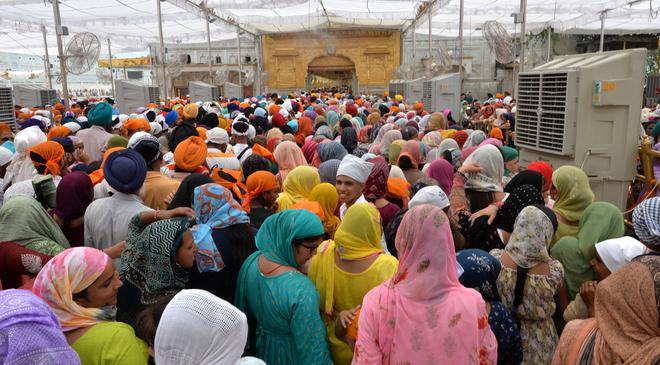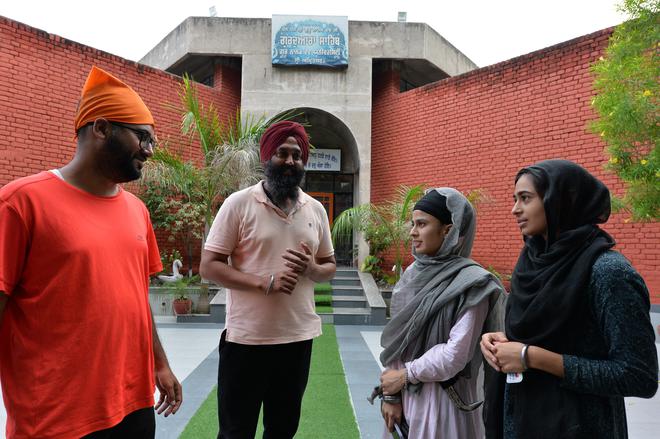As devotees walk through Heritage Street of Amritsar, the sound of melodious Gurbani kirtans (sacred hymns) fill the air. This is one of the oldest streets of the city and is lined with shops. Thousands throng the no-traffic zone, which leads to the Golden Temple. Gurbani kirtans are sung when the portals of the temple are open in the wee hours of morning. The singing stops when the portals close during the evening. The hymns are sung by Sikh clerics sitting in the gilded complex of the temple. Today, the Gurbani is at the centre of a political controversy in Punjab.
On June 20, 2023, the Punjab government passed the Sikh Gurdwaras (Amendment) Bill. Through the Bill, the Aam Aadmi Party (AAP)-led government is seeking to amend the Sikh Gurdwaras Act, 1925, which was enacted for the administration of certain Sikh gurdwaras in Punjab, Haryana, Himachal Pradesh, and Chandigarh. The government’s aim is to ensure that the broadcast and telecast of the Gurbani from the Golden Temple is free for all channels. The rights up until this point lay with G-Next Media Private Limited, which runs PTC Punjabi, a channel in which Shiromani Akali Dal leader Sukhbir Singh Badal has a majority stake. Chief Minister Bhagwant Mann said that the Bill aimed to ensure that there was no undue control of a “particular family” over the rights to telecast the Gurbani.
On June 26, the Shiromani Gurdwara Parbandhak Committee (SGPC), the apex governing body of all the Sikh gurdwaras in India and abroad, rejected the Bill. An angry SGPC said it would not tolerate “the Punjab government’s interference in the Sikh Gurdwaras Act”. Terming the move unconstitutional and politically motivated, it asked the government to withdraw the Bill or be ready to face an “intensified struggle”.
The president of the SGPC, Harjinder Singh Dhami, also pointed out that an amendment to the Act was possible only with the recommendations of the governing body. “Before making any amendment to the Sikh Gurdwaras Act, the approval of two-thirds of the members of the SGPC’s general house cannot be ignored,” he said. Political parties including the Shiromani Akali Dal also criticised the government.
While some people are angry about the move, others support it. For the AAP, which has formed the government for the first time in the State that borders Pakistan, this controversy poses yet another challenge.
‘Catastrophic decision’
Several people said the decision was an unnecessary mixing of political and religious issues. Gurpreet Kaur, 23, a law student at the Guru Nanak Dev University in Amritsar, termed the blend of politics and religion in Punjab “catastrophic”. Sitting outside the Gurdwara Sahib inside the campus of the university, she said, “The Sikh Gurdwaras Act manages the affairs of gurdwaras. It mandates the SGPC to take appropriate decisions. The AAP government should not have introduced the Bill in the Assembly. It could have separately probed the allegations of business interests surrounding the telecast of the Gurbani.”
Her friends concurred. They said decisions on amendments to religious laws should be made by people who have been associated with religious bodies for years, and not politicians.
Charanjit Singh, 33, a doctoral student at the university, said political parties use religion to serve their interests. “The government and the SGPC are having a face-off and it appears that both are not doing enough to resolve the issue,” he said. He believed that this would eventually hurt Punjab. “The AAP has formed the government in Punjab for the first time. To create and stabilise a vote bank, the party seems to be trying to woo Panthik (Sikh) voters. The AAP has been in power for around one and a half years. In this short period, how much clarity has it gathered on sensitive Sikh issues? Before introducing a Bill, the government should have made an effort to build consensus. The party seems to be in a rush. This issue does not concern just Sikhs, but the whole of Punjab and Punjabiyat,” he said.

A few kilometres from the university, devotees thronged the Golden Temple. Jasbir Singh, 53, a devotee at the Bazaar Mai Sewan market adjacent to the temple, said the government was creating conflict. “If the AAP feels that the SGPC has been grabbed by someone, it should contest elections and get the body freed,” he said.
Harvinder Singh sells Rumala Sahib (rectangular pieces of silk used to cover the Guru Granth Sahib in the gurdwara), kadas (bangles) and other ceremonial articles associated with the Sikh faith on Heritage Street. He said if parties decided to “interfere” in matters related to Sikhism, it could be “dangerous for the quom (community).”
“If there are allegations that the telecast of the Gurbani has been monopolised by one TV channel belonging to a political party, the SGPC could start its own channel. But the government should stay away,” he said firmly.
‘A good step’
The Vidhan Sabha passed the Sikh Gurudwaras (Amendment) Bill with a majority. Section 125A stipulates that it will be the “duty of the Board (SGPC) to propagate the teachings of the Gurus by making uninterrupted (without any on-screen running advertisements/commercials/distortions) live feed (audio, or audio and video) of [the] holy Gurbani from Harmindar Sahib [Golden Temple] available free of cost to all media houses, outlets, platforms, channels etc. whoever wishes to broadcast it.”
The rights to broadcast the Gurbani are granted by the SGPC. According to Dhami, as per the rules, since 1998, the SGPC had given the rights to broadcast the Gurbani from the Golden Temple to various channels. The current agreement with G-Next Media is up to July 2023. “This agreement was signed on July 24, 2012 for 11 years and now, after its expiration, a fresh process will be carried forward,” Dhami said. Under the ongoing agreement, G-Next Media had decided to pay ₹1 crore annually, with a yearly hike of 10%, to the education fund of the SGPC. Dhami claimed that the due amount had been deposited.
Mann alleged that the SGPC, under the influence of a “family”, had given the intellectual property rights of telecasting the Gurbani to a channel owned by that family. He also dismissed the move as an attack on Panth. That one family had control over the telecast of the Gurbani is unwarranted and unjustified, he said.
Some Sikhs agree with the government’s reasoning. “If the Act is amended, there will be further reach of the Gurbani as more channels will be allowed to telecast it. That’s a good step, right,” said Sonu Singh, a vendor at Dharam Singh market on Heritage Street.

Suraj Singh, who runs a travel business in Amritsar, agreed. “The move is commendable. It looks like the Opposition parties and the SGPC are trying to make this a religious issue,” he said.
Question of autonomy
The SGPC, which is also referred to as the “mini-Parliament of Sikhs”, is directly elected by Sikhs who are registered as voters under the provisions of the Sikh Gurdwaras Act. However, questions are often asked about the SGPC’s autonomy being subverted by the Badals.
Experts said that while the government’s moves have created a controversy again, it has also sparked a debate on the SGPC’s autonomy. “During the early years of the SGPC’s inception in the 1920s, only those who were deeply committed to the faith fought the election. They managed the shrines and propagated the faith well. Now, nothing is being done about the evil practices in the electoral system. The Akali Dal, which was born of the SGPC, slowly began to control the parent body. The Akali Dal leadership has been in the hands of one family since the 1990s,” said Dharam Singh, former professor of Sikh Studies at Punjabi University, Patiala.
Singh said that excessive political interference in the functioning of the SGPC, whether in the selection of candidates for election or the swearing-in of the president, is too glaring to be overlooked. “As per the Sikh principle of miri piri, religious values are supposed to dominate politics, but it appears to be the opposite. The need of the hour is to ensure that the SGPC is not controlled by one family and to let it function in a democratic and transparent manner,” he said.
The century-old Akali Dal, which claims to be the sole representative of the Panthic community, suffered a drubbing in the last two Assembly elections indicating that its Panthic support base has eroded substantially. At a time when the party is going through a rough patch, the AAP’s latest move could lead to more testing times. The Akali Dal has been facing charges from Opposition parties of destroying the autonomy of the SGPC and the Akal Takht, the highest Sikh temporal seat.
Singh added that the Akali Dal gave up its Panthic agenda at its 1996 conference in Moga and became a Punjabi party. “As a result, many non-Sikhs not only became its members, but occupied offices of importance as well. The rich classes joined the Akali Dal to further their business interests. This resulted in the gradual alienation of Sikhs. No doubt, this has helped the Akali Dal retain power in Punjab, but there have been occasions of Sikh causes suffering at the altar of political exigency,” he said.
“For fair play, no political party should be allowed to contest the SGPC election,” he added. “Only well-meaning Sikhs, whatever be their political affiliations, should contest independently.”
The responsibility of conducting elections for the SGPC lies with the Central government. The elections are supposed to be held after five years. The last SGPC elections were held in 2011.
The Akali Dal dismissed these allegations. “There is a democratic process for electing the SGPC body. Other parties also contest elections. If a majority of members of the Akali Dal contested and won the election, you cannot say the SGPC has become Akali Dal. A majority of us are represented in the SGPC, and the elected house and its president have the right to take decisions,” said party leader Daljeet Singh Cheema.
Given the resistance from several Sikh bodies and the public, the government may find it difficult to implement its decision. Amarjit Singh, Director at the Centre on Studies in Sri Guru Granth Sahib at Guru Nanak Dev University, said the government’s decision was wrong because it is the SGPC that has the right to take decisions on gurdwara affairs under the 1925 Act. “Even though several Sikhs would want the Gurbani telecast to be available on as many different channels as possible, the manner in which the government has acted has largely been unacceptable to the Sikhs. The government should have deliberated the issue with the SGPC and others,” he said.
He also pointed out that Sikhs have never accepted interference in their affairs. “In 2015, the Akali Dal was in power. The SGPC, which was in its control, arranged an Akal Takht-stamped pardon to Dera Sacha Sauda chief Gurmeet Ram Rahim Singh in the 2007 blasphemy case. Yet, the party faced a severe backlash from the Sikhs, and the pardon edict had to be rescinded. This shows that Sikhs do not accept government interference in religious matters.”







